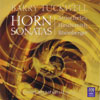Hindemith; Moscheles; Rheinberger Horn Sonatas
A Tuckwell swansong finds the horn player truly rising to the occasion
View record and artist detailsRecord and Artist Details
Composer or Director: Ignaz Moscheles, Paul Hindemith, Joseph (Gabriel) Rheinberger
Genre:
Chamber
Label: ABC Classics
Magazine Review Date: 12/2006
Media Format: CD or Download
Media Runtime: 66
Mastering:
Stereo
DDD
Catalogue Number: ABC476 5254

Tracks:
| Composition | Artist Credit |
|---|---|
| Thème varié (Feuillet d'album de Rossini) |
Ignaz Moscheles, Composer
Barry Tuckwell, Horn Daniel Blumenthal, Piano Ignaz Moscheles, Composer |
| Introduction and Rondeau écossais |
Ignaz Moscheles, Composer
Barry Tuckwell, Horn Daniel Blumenthal, Piano Ignaz Moscheles, Composer |
| Sonata for Horn/Alto Horn/Alto Saxophone and Piano |
Paul Hindemith, Composer
Barry Tuckwell, Horn Daniel Blumenthal, Piano Paul Hindemith, Composer |
| Sonata for Horn and Piano |
Paul Hindemith, Composer
Barry Tuckwell, Horn Daniel Blumenthal, Piano Paul Hindemith, Composer |
Author: Ivan March
Barry Tuckwell's career, as LSO principal horn for 13 years and as the first musician to earn a full-time living as a horn soloist, stretched for more than half a century, and is celebrated elsewhere by two sets of concertante recordings made over the years: an EMI two-CD Gemini collection and a comparable Decca Double.
Just before he retired in 1997, Tuckwell recorded the present programme with Daniel Blumenthal for the Australian Broadcasting Company. He included the comparably familiar and somewhat marmoreal Hindemith F major Sonata (1939) and plays it persuasively, but also provides a recording premiere of a virtually unknown Second Sonata from 1943. This has an appealingly nostalgic opening movement which acts as a brief prelude to the virtuoso Scherzo. Then comes another short lyrical interlude, no less touching, with a surprising hint of folksong in the melodic line, and the work is completed by a brilliant finale with a thrilling piano part, in which bravura and lyrical elements are satisfying combined. This is much more enjoyable work than the F major Sonata, melodically memorable (which is what counts) but also superbly written for both instruments.
The Hindemith sonatas are prefaced here by Moscheles's very personable set of variations on a theme which Rossini wrote for Moscheles's son, Felix, and a most engaging Introduction and Rondo with an even more jaunty principal theme, which is expanded infectiously, rather in the sprightly rhythmic manner of Hummel. The closing work is a large-scale sonata by Rheinberger, framed with heroically dramatic outer movements, both with bold, fanfare-like main themes with appropriately lyrical counterparts, and a gentler, romantic central Quasi adagio. Needless to say, Tuckwell rises to the occasion throughout the programme, as does his excellent partner. The recording is resonant and true, giving the instruments plenty of space and a natural balance.
Just before he retired in 1997, Tuckwell recorded the present programme with Daniel Blumenthal for the Australian Broadcasting Company. He included the comparably familiar and somewhat marmoreal Hindemith F major Sonata (1939) and plays it persuasively, but also provides a recording premiere of a virtually unknown Second Sonata from 1943. This has an appealingly nostalgic opening movement which acts as a brief prelude to the virtuoso Scherzo. Then comes another short lyrical interlude, no less touching, with a surprising hint of folksong in the melodic line, and the work is completed by a brilliant finale with a thrilling piano part, in which bravura and lyrical elements are satisfying combined. This is much more enjoyable work than the F major Sonata, melodically memorable (which is what counts) but also superbly written for both instruments.
The Hindemith sonatas are prefaced here by Moscheles's very personable set of variations on a theme which Rossini wrote for Moscheles's son, Felix, and a most engaging Introduction and Rondo with an even more jaunty principal theme, which is expanded infectiously, rather in the sprightly rhythmic manner of Hummel. The closing work is a large-scale sonata by Rheinberger, framed with heroically dramatic outer movements, both with bold, fanfare-like main themes with appropriately lyrical counterparts, and a gentler, romantic central Quasi adagio. Needless to say, Tuckwell rises to the occasion throughout the programme, as does his excellent partner. The recording is resonant and true, giving the instruments plenty of space and a natural balance.
Discover the world's largest classical music catalogue with Presto Music.

Gramophone Digital Club
- Digital Edition
- Digital Archive
- Reviews Database
- Full website access
From £8.75 / month
Subscribe
Gramophone Full Club
- Print Edition
- Digital Edition
- Digital Archive
- Reviews Database
- Full website access
From £11.00 / month
Subscribe
If you are a library, university or other organisation that would be interested in an institutional subscription to Gramophone please click here for further information.




